First, pick a Jack.
Jack #1: Sad Sack Jack
Never nominated, he worked a lot but wasn’t taken seriously, was given few chances to stretch beyond comedies. He was a depressive who drank too much and was awkward and distant in intimate relationships. Died at 52, weeks after being diagnosed with stomach cancer, which he kept secret until just before his death on January 3, 1963—same day Dick Powell passed, also from cancer.

Jack #2: Official Studio PR Release Jack
Best remembered for comedy but equally good in his dramatic outings. Star of film, radio, and TV, gone too soon but left us a great list of memorable movies to enjoy. A big guy—6’ 2”, 220lbs—who started in vaudeville, then brought his singing, dancing, and clowning skills to Hollywood in 1936, got into radio in 1938, then later television. Lived a full, if brief, life, marrying four times and fathering two children.
Jack #3: man of mystery
He used to disappear for lengthy stretches in the ‘40s, touring on the down-low with Clyde Beatty’s circus as a clown, incognito behind his greasepaint, gratifying his slapstick jones and making kids laugh. Also, he was one of the best-read people in Hollywood, and was working on a book about religion when he died.
So…which Jack speaks to you?
I love What a Character! so much, I keep a list of possible subjects on hand, and one of the things that really attracts me to a particular actor beyond my admiration for their work is my curiosity about them as people. When and where did they grow up, and in what circumstances? From a showbiz family? When did they begin to act? What was their path to the movies, and did they enjoy the work or just not know anything else? How did they live, did they have a family? What did they care about, how did they spend their time off? How did they feel about their work? How seriously did they take themselves and the industry? And of course, how and when did they die, and what did they leave behind?
Thing is, with most character actors, most of that is simply not knowable. Character actors don’t get that much press, so they don’t necessarily leave interviews in print or video to help us out. They rarely published memoirs, even the most celebrated of them. Because these are the actors we know best by face and voice, not name, who’s going to buy a book by someone whose name they might not even recognize?
So I poke around online, starting with the usual suspects: Wikipedia, Find a Grave, that stuff. I look for videos on YouTube, hoping for interviews and talk show appearances. With Carson, who did quite a lot of television work, I was shocked by how little turned up. There’s a Lux Radio Theater version of Roughly Speaking (1945), a swell movie and favorite of Robert Osborne’s, where Carson and Rosalind Russell reprise their movie roles, but that’s all she wrote, pretty much. Not far from the top of the search results, I started getting results on Johnny Carson, not Jack, a sure sign there just aren’t that many videos of any kind of Jack Carson.
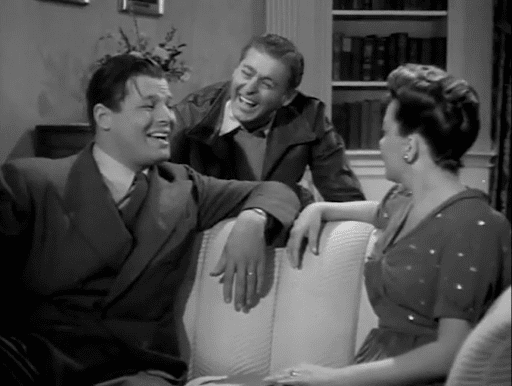
Doris Day knew Carson, with whom she costarred in several movies at the beginning of her movie career and briefly dated. She wrote a few hundred words about him in her memoir Doris Day, Her Own Story:.
“During the making of the film, Jack Carson started taking me out, and I spent more and more time with him. He was divorced and lived in a beautiful home in Longridge, out in the Valley. A couple who once worked with him in vaudeville lived there and took care of the house for him. Jack was a very sweet, considerate man whom I liked very much, but I wasn’t in love with him. I spent a lot of time at his place and often stayed there with him, but Jack was a closed man who couldn’t communicate. He was amusing and we got along very well, but I was just out of a marriage where there had been no communication, and I wasn’t about to repeat that mistake.
“Perhaps Jack was in love with me, I don’t know. He was basically a lonely man who drank too much. When he became too serious about us, I eased away from him and eventually stopped going with him. But I have fond memories of Jack, of how much fun we had at parties where he was comical and entertaining—but then when we got back to his place, he would often sit with a brandy bottle, the party spirit gone, lapsing into a kind of quiet sadness. My second picture, My Dream Is Yours, was also made with Jack, but after that we fell out of touch. Some years later, after a long and painful illness, he died of cancer.”
And in the absence of more firsthand about Carson, I thought, Ahhhh…poor dude, he was one of those unhappy people unable to relate to his fellow humans. Without meaning to, I was beginning to create my DIY Carson. Because the only person whose word we have on this is Doris’s, and I’m not saying she related her experience dishonestly, but it was just one person’s experience, and we don’t have any other firsthand witnesses to confirm it.
Maybe Carson, who was the person who called Day to let her know she had not only been cast in Michael Curtiz’s Romance on the High Seas but cast as the lead *in her first movie*, was going through his own rough patch, like she was (her career was going great, but she was still recovering from her abusive second marriage), and neither of them were ready for a relationship at the time. Maybe…fill in the blank. Or maybe he was like Dean Martin, who projected an easy familiarity that made audiences feel like they knew him, while successfully covering a powerful drive to not be known.
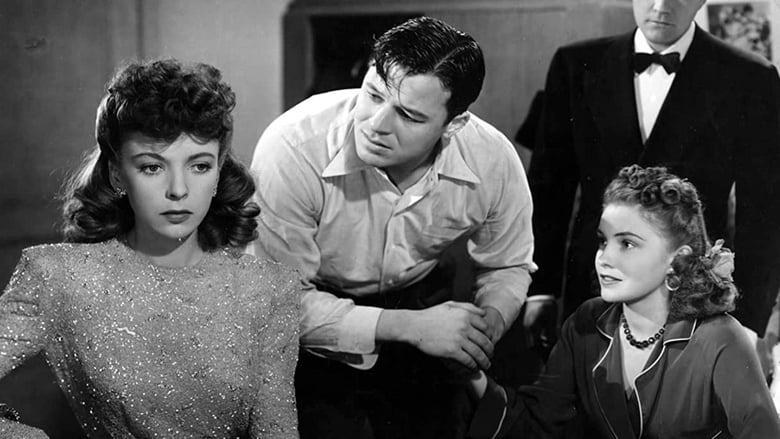
So I kept looking at Carson’s online bios wherever I could find them. (NOTE: obits are another great source, but weirdly I couldn’t find one in either Variety’s or The Hollywood Reporter’s archives.) When you read multiple bios of people we don’t know much about, you end up reading mostly the same set of “facts”—since they’re presented without sources, I have no way of confirming anything they say. So I’m scanning these bios, yadda yadda yadda, and once in a while some new assertion pops up. Like the thing about Carson stealing away from Hollywood to anonymously clown with Clyde Beatty’s circus. How intriguing! But…is it true? I have no idea.
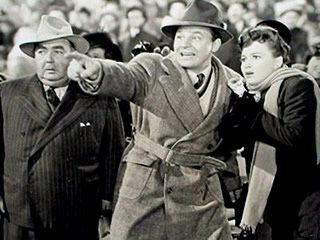
Was he really one of the best read people in Hollywood? I think that’s in the TCM bio, but again, it’s not sourced, so…true or not? It’s plausible enough, but we don’t have Carson talking about the writers and books he loves, or saying he is a voracious reader. We can’t expect Doris to toss that into her couple of paragraphs about their relationship. So it’s just left hanging out there, tantalizing but unknowable.
It would be great to believe that because something shows up in multiple bios, that makes it more likely to be true, but a lot of people think Fatty Arbuckle was guilty because Hollywood Babylon said so, or perhaps they don’t care if it’s true or not because they like the story and will repeat it even if you show them it’s a vile lie.
All of which means that functionally, we are all William Alland, who plays the reporter who spends Citizen Kane trying to find out what Kane’s last words mean because his editor thinks they might sum Kane up, make his life make sense. But as Alland himself tells his colleagues (and us) in the film’s final moments, No, he didn’t find out what Rosebud means, and even if he had, it wouldn’t have solved the riddle of a man’s identity. “What have you been doing all this time?” one of his colleagues asks. “Playing with pieces of a jigsaw puzzle,” he replies.
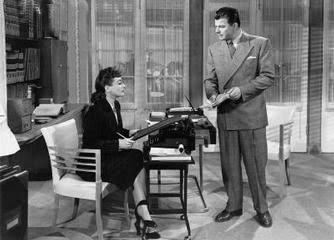
All the bios agree that John Elmer “Jack” Carson was born in 1910 in Carmen, Manitoba, and that his father moved the family to Milwaukee when Jack was 4 years old, and that Jack considered himself an American rather than a Canadian and Milwaukee his real hometown. He went to high school, then college, which is where he supposedly stumbled onstage while playing Hercules and pulled down half the set, to general hilarity, which gave his friend Dave Willock the idea the two of them should form a vaudeville team in 1931. One bio claims Carson was kicked out of college for gambling and drinking. True or false? The others make it sound like he left school to tour, but of course he could have been kicked out around the time he was going to leave. Or not.
No argument that Carson and Willock show up in Hollywood in 1936, and Carson gets work at RKO as a bit player. You notice him right away, nobody looks or sounds quite like him. He’s one of Lucille Ball’s Seattle suitors in Gregory La Cava’s Stage Door (1937). He’s an unbilled “circus roustabout” in Howard Hawks’s Bringing Up Baby, and a maitre’d in George Stevens’ Vivacious Lady, both in 1938. By 1939 he’s playing slightly larger, credited bits in A movies like Capra’s Mr. Smith Goes to Washington (1939). Then in 1941 he’s at Warner Bros with a pivotal role in Raoul Walsh’s The Strawberry Blonde, playing Hugo Barnstead, the kind of friend who always promises Cagney’s Biff Grimes great things and always leaves him holding the bag, eventually setting him up as the patsy for Hugo’s corrupt business practices and landing Cagney in jail. Cagney eventually gets his revenge in the most satisfying way, and we are there for it.
When the war started, Carson tried to enlist first in the Air Force but was turned down because of his height. Then he tried the army and was turned down on account of flat feet. So he and his movie partner Dennis Morgan—the two appeared in 11 movies together—toured widely in the Pacific, performing for the troops.
In 1942, he plays Joe Ferguson in a favorite of mine, Elliott Nugent’s The Male Animal (cowritten by Nugent and James Thurber), costarring with Henry Fonda, Olivia de Havilland, Joan Leslie, Eugene Pallette, Don Defore, and Hattie McDaniel. This is comedy, but not the air-headed kind Warners so often used Carson in. It’s a smart story about a college campus where a gentle English professor (Fonda) is under pressure not to read a certain letter to his class because said letter was written by an anarchist, and the blustering, abrasive college trustee (Pallette), who lives for football and only grudgingly admits the college actually has to offer classes, is very hot to purge the faculty of anyone he deems insufficiently red-blooded and 100% American. Carson is the ex-football player, the returning hero back for the Big Game. He’s a pretty decent guy: not too bright, maybe, and trapped in reliving his glory days on the gridiron, but he isn’t mean or malicious. You can’t help but like him. The character crackles with energy. It’s like he is about to burst through his suit, burst through a wall, just with sheer animal spirits. Carson delivers laughs but also provides a macho foil for Fonda, who feels not just pressure from Pallette to fold, to appease him by giving up reading that letter, but also by Carson’s attentions to de Havilland, and by seeing his campus alarmingly transformed from its normal relative peace to a football frenzy featuring a torch-bearing mob and a huge bonfire at the pre-game rally, imagery moviegoers were by now familiar with from newsreel footage of Nazi Germany.
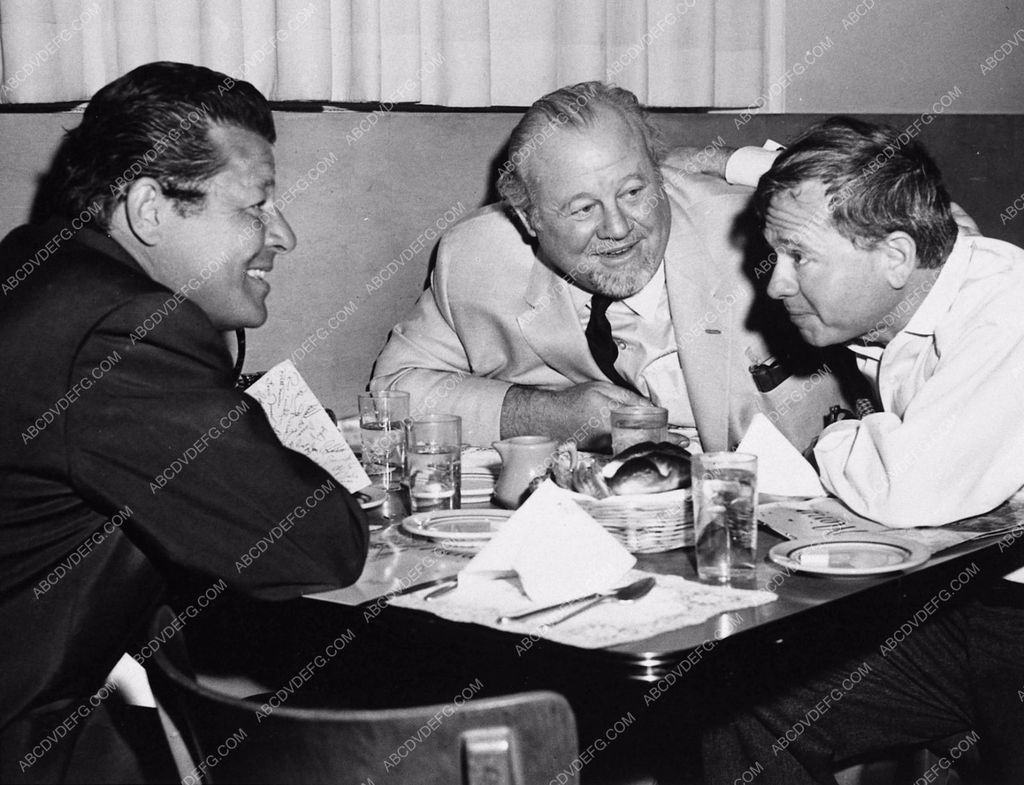
In 1945, Carson had two of his most substantial noncomedic roles: in Roughly Speaking, a romantic comedy costarring Rosalind Russell, and of course as Wally Fay, the guy on the make for money and, hey why not, a little nooky, in Mildred Pierce. The way Wally sees it, the fact that a few hours ago he sold out Mildred’s business shouldn’t interfere with them canoodling. As he says approvingly of himself, once he starts chiseling, he just can’t stop—but you shouldn’t hold it against him, it’s nothing personal.

This brings me to the question of why Carson wasn’t nominated for a Best Supporting Oscar for Mildred Pierce, or later on for Gooper in Richard Brooks’s Cat on a Hot Tin Roof (1958). I don’t know who else was nominated those years, which might answer the question. But I also think that, like the nauseatingly unpleasant, clueless New York Times obituary, the Academy had a fixed idea of Carson as a comic, and a comic of a certain type—the Times says something like “pudgy-faced comic, like Jack Oakie.” Now, I bow to no one in my love of Jack Oakie, but…seriously?
So that’s my Long Day’s Journey to Jack Carson, and we are no closer to understanding what made him tick, what he was like to work with or live with.
The entry on Carson in The Biographical Dictionary of Film deftly sums up the glory that is Jack:
“Never nominated or celebrated, never given lead roles in front-rank pictures, Jack Carson could be stupid, vacant, coarse, vain, amiable, decent, touching, nasty, hateful…even ordinary. Somehow one doubts that he ever got, or needed, much direction. Instead he understood story and character. He was cast, and he was relied on, and let us say that one in ten times he was indelible… Apart from that, he was only perfect.”
I quite agree. Good thing you don’t have to understand a person to love them.
Here’s a link to an excellent resource on Jack’s work, a fan website someone has put a lot of work into, not just for movies but also radio and television.
This was written for the 10th annual What a Character! blogathon, sponsored by Aurora, Kellee, and Paula. Get over there and read the other entries, do not delay!

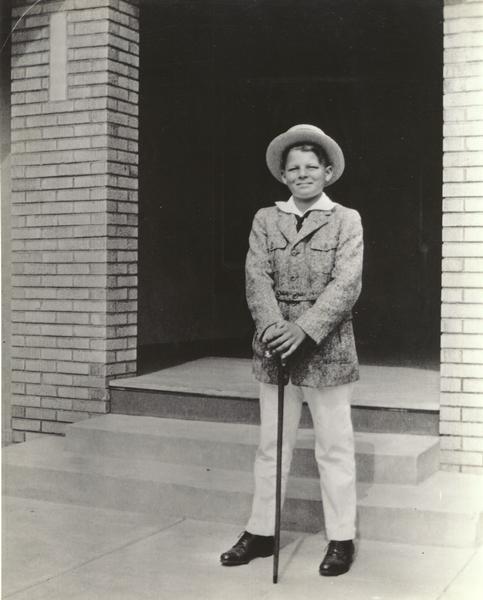
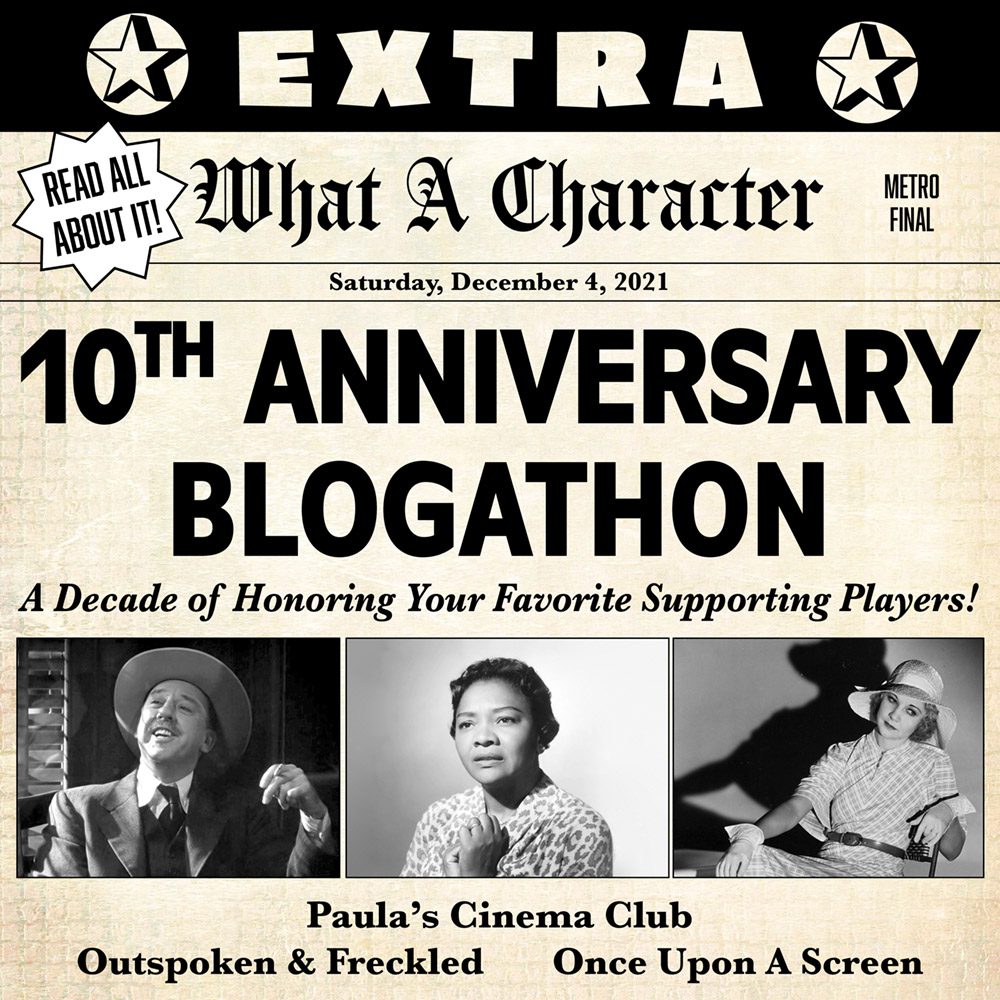

Hi Lesley, thank you for writing this about one of my favorite actors. I learned a lot about him and it makes me sad that he was ever sad.
Yeah, I hate to think of Jack being sad, too…partly just because I’m so fond of him and partly because there’s something particularly poignant about a person who is so good at projecting ease and lightheartedness (again, thinking of Dean Martin, too) being so isolated inside.
Yeah, very versatile & mucho underrated as a dramatic actor! IMHO. His work in “Cat on A Hot Roof” with Elizabeth Taylor, Paul Newman & Burl Eves, was a standout & basically stole every scene he was in, with those 3 great scene stealers themselves!
Jack Carson, should have won an Oscar for that part alone, or at least be nominated?
We movie-lovers are nuts, aren’t we? I know exactly what you are talking about here. Although Jack Carson was not my quest, there are a few deliberately unknowables who have always sent me digging for more nuggets of information. Jack Carson could play so many types – it stands to reason that he never was 100% settled on his true self – maybe that’s what makes a great character actor. Really, really loved your post.
Thank you kindly, Marsha. Excellent point about him perhaps not being completely settled within himself as to his identity. Reminds me of another actor with almost scary range—Peter Sellers. Though while Sellers disappeared entirely into his roles, Carson was totally believable in everything and yet all that still seemed to flow freely and directly from his Jack-ness.
You raise some excellent points about how hard it is to get real info on some character actors.
I love how you started your essay, by asking which Jack you relate to? I admit I love the Studio PR Jack, but I wish he were able to do more drama. (He’s one of the best things about Mildred Pierce, in my opinion.)
Fabulous post, as always.
Thank you kindly!
Thank you for this thoughtful article. I am so happy to have the Jack we think we know and so sad that we can’t just rush up and give the Jack we should know our gratitude.
No, thank you! I bet it would have meant something to know we really got and appreciated his drama chops, since they so largely went unacknowledged.
I hope it’s true that Jack would disappear to perform as a circus clown, if only because it’s such an odd bit of potential bio. I’ve long been a fan of his and completely agree with his entry in the Biographical Dictionary of Film.
Agree on all counts, and also wish there was a way to run down whether he was the voracious reader one bio said he was, and whether he was working on a book. But since his daughter passed away in 2010, there’s probably nobody to even ask.
Oh this is wonderful! Always entertained by Jack Carson. I really loved this piece- great information, new to me. Sad stuff about his personal life. My personal favorite role of his was in MILDRED PIERCE, but I also loved his lighter stuff like when he was paired with Doris Day and Jane Wyman. Thanks so much for joining our blogathon!
Thanks for this wonderful post about Jack Carson, one of my all-time favorite actors! I thought you might enjoy the YouTube playlist I recently assembled. Here you go!
https://youtube.com/playlist?list=PLFRgWeEx30kEw8pKI9NweI3z1YF1VwFAO
PS. I am @holyspacemonkey on Twitter. I also have a tribute account for Richard Carlson (@RichardDCarlson), and I’m working on a biography of him.
Thank you Nicole, will check out the playlist!
I’m a Carlson fan, too, btw.
Doris Day’s first marriage was abusive not her second
Per her memoir, the second marriage, to Virginia Weidler’s brother, was also abusive.
Couldn’t agree more, so talented, much MORE than the Buffon that in the character’s he had to play for studios perception of him! Look at “Mildred Pierce”, with Joan Crawford, or with Burl Ives (Dying of stomach cancer!) as his son in “Cat on a Hot Tin Roof” & stealing scenes from Elizabeth Taylor, Paul Newman & others! Even those early pictures with Doris Day, he showed so much talent! Ironically Jack Carson died of the same stomach cancer THAT supposedly “Big Daddy”, i.e., Burl Ives died of? RIP JACK CARSON, A Great actor & star in his own Right! IMHO